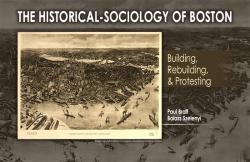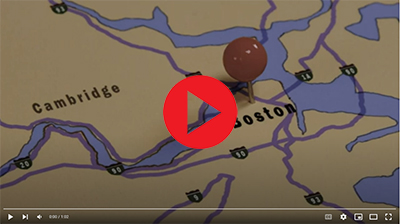The Historical-Sociology of Boston: Building, Rebuilding, & Protesting
Author(s): Paul Braff , Balazs Szelenyi
Edition: 1
Copyright: 2022
In this online turn-key course package, students will learn about Boston’s history in a few different ways. First, they will look at its historical development with a particular focus on the city’s economics and demographics. This will give students proper context for the second half of the course in which they will examine Boston post-World War II to look at how the city attempted to alter its outlook both economically and demographically. In this course, students will explore primary source materials that supplement readings. Letters from children, adults, committee minutes, and protest signs and photographs are all gathered here to give students as complete a picture as possible of how participatory democracy developed in the city.
Chapter 1: Boston (An Overview)
Chapter 2: Preurban Boston (12,000 BCE–1630 CE)
Chapter 3: A Short Social and Economic History of Boston (1630–2003)
Chapter 4: Boston as the Immigrant City
Chapter 5: Urban Development - Neighborhood Studies (1950s-1960s)
Chapter 6: Urban Development - Neighborhood Studies (1960s–1970s)
Chapter 7: A Short History on Education Inequality in Boston (1624-1975)
Chapter 8: Boston (Present-Future)
Paul Braff received his Ph.D. from Temple University in 2020 and teaches classes on U.S. History, African American History, and U.S. Government for Northeastern University and Julia R. Masterman High School. His major areas of research include urban history, African American History, and the history of public health. Based on that research, he published an article on a public health campaign organized and led by African Americans in the early to mid-20th century in the American Journal of Public Health. His work has also been published in the academic journals Perspectives on History and Strategic Visions and he was selected to give the Iago Gladstone Lecture in the History of Medicine at the New York Academy of Medicine in March 2018. He was a Research Fellow at the Consortium for History of Science, Technology, and Medicine and has received grants from the National Science Foundation and the Society for the Social History of Medicine. Currently, Paul is revising his dissertation on National Negro Health Week to develop it into a book. His work examines how a population overlooked by the medical establishment took control of its own health needs.
Balazs Szelenyi received his Ph.D. from UCLA in 1998 and teaches classes on Philosophy, Globalization, Sociology, and History for Northeastern University. His first major area of research was on urban history and urban development. Based on that research, he published his first book called The Failure of the Central European Bourgeoisie (2006), and an article on the dynamics of urban development in the early modern period in the American Historical Review. His second area of research was on the origins and causes of genocide, for which he received fellowships from the National Endowment of Humanities, the American Council of Learned Societies, the Fulbright Commission, and the German Marshal Fund. In 2003, he was named a Fulbright New Century Scholar for his research on genocide and the Holocaust. He has published articles in the academic journals Past and Present, Theory and Society, Social History, and the Austrian History Yearbook. Balazs has also coedited a book called Cores, Peripheries and Globalization (2011). Currently, Balazs is finishing his book on the Holocaust called From Minority to Übermensch, as well as developing a new interest on the impact of technology on society and the moral dilemmas involved in the evolution of transhumanism.
In this online turn-key course package, students will learn about Boston’s history in a few different ways. First, they will look at its historical development with a particular focus on the city’s economics and demographics. This will give students proper context for the second half of the course in which they will examine Boston post-World War II to look at how the city attempted to alter its outlook both economically and demographically. In this course, students will explore primary source materials that supplement readings. Letters from children, adults, committee minutes, and protest signs and photographs are all gathered here to give students as complete a picture as possible of how participatory democracy developed in the city.
Chapter 1: Boston (An Overview)
Chapter 2: Preurban Boston (12,000 BCE–1630 CE)
Chapter 3: A Short Social and Economic History of Boston (1630–2003)
Chapter 4: Boston as the Immigrant City
Chapter 5: Urban Development - Neighborhood Studies (1950s-1960s)
Chapter 6: Urban Development - Neighborhood Studies (1960s–1970s)
Chapter 7: A Short History on Education Inequality in Boston (1624-1975)
Chapter 8: Boston (Present-Future)
Paul Braff received his Ph.D. from Temple University in 2020 and teaches classes on U.S. History, African American History, and U.S. Government for Northeastern University and Julia R. Masterman High School. His major areas of research include urban history, African American History, and the history of public health. Based on that research, he published an article on a public health campaign organized and led by African Americans in the early to mid-20th century in the American Journal of Public Health. His work has also been published in the academic journals Perspectives on History and Strategic Visions and he was selected to give the Iago Gladstone Lecture in the History of Medicine at the New York Academy of Medicine in March 2018. He was a Research Fellow at the Consortium for History of Science, Technology, and Medicine and has received grants from the National Science Foundation and the Society for the Social History of Medicine. Currently, Paul is revising his dissertation on National Negro Health Week to develop it into a book. His work examines how a population overlooked by the medical establishment took control of its own health needs.
Balazs Szelenyi received his Ph.D. from UCLA in 1998 and teaches classes on Philosophy, Globalization, Sociology, and History for Northeastern University. His first major area of research was on urban history and urban development. Based on that research, he published his first book called The Failure of the Central European Bourgeoisie (2006), and an article on the dynamics of urban development in the early modern period in the American Historical Review. His second area of research was on the origins and causes of genocide, for which he received fellowships from the National Endowment of Humanities, the American Council of Learned Societies, the Fulbright Commission, and the German Marshal Fund. In 2003, he was named a Fulbright New Century Scholar for his research on genocide and the Holocaust. He has published articles in the academic journals Past and Present, Theory and Society, Social History, and the Austrian History Yearbook. Balazs has also coedited a book called Cores, Peripheries and Globalization (2011). Currently, Balazs is finishing his book on the Holocaust called From Minority to Übermensch, as well as developing a new interest on the impact of technology on society and the moral dilemmas involved in the evolution of transhumanism.




